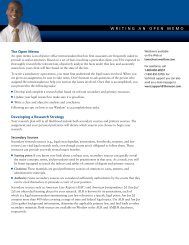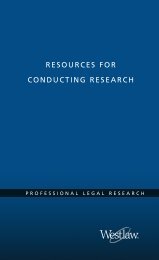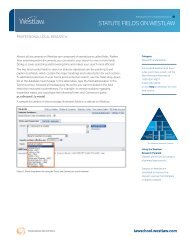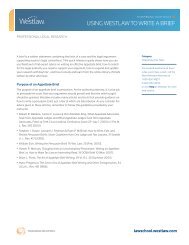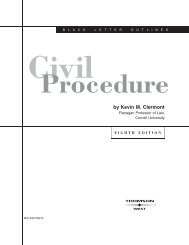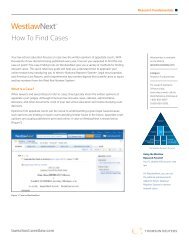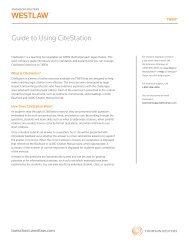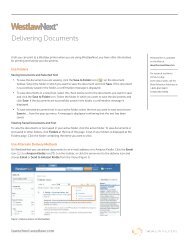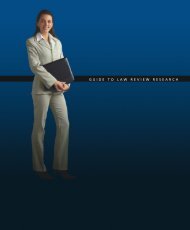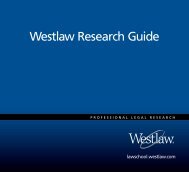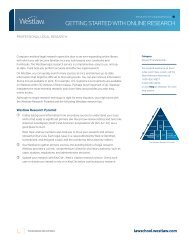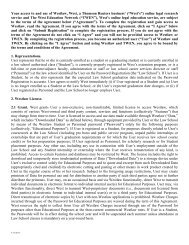Winning Research Skills - Westlaw
Winning Research Skills - Westlaw
Winning Research Skills - Westlaw
Create successful ePaper yourself
Turn your PDF publications into a flip-book with our unique Google optimized e-Paper software.
Chapter 1<br />
A Short History of Legal <strong>Research</strong><br />
Our short history of legal research begins with the earliest days of the American republic. Finding the<br />
law was pretty simple for the small group of lawyers who practiced 200 years ago. Almost all the<br />
information they needed was contained in the American edition of Blackstone’s Commentaries on<br />
the Laws of England—the great multivolume, comprehensive law text of the 18th century. With<br />
Blackstone, a desk, and an inkwell, you were a lawyer.<br />
The Development of Legal Publishing<br />
By the end of the 19th century, even the most erudite attorney could know only a fraction of the law.<br />
Responding to the need for a way to manage the growing body of legal information, large legal<br />
publishing companies developed. Many of today’s legal publishers, such as West, began their work<br />
during this period.<br />
Between 1875 and 1900, legal publishers introduced the types of law books you’ll find in the library<br />
today, such as regional reporters, case law digests, and citators. They also developed updating and<br />
supplementing tools such as pocket parts, advance sheets, and looseleaf services.<br />
During the second half of the 20th century, publishers turned to technology as the body of cases,<br />
statutes, and regulations grew. One of the first solutions, for example, was to use microfiche for<br />
mass storage. A filing cabinet of fiche could replace a whole library of books. This technology,<br />
however, never really took hold. It was difficult to use and offered little in the way of enhanced<br />
value.<br />
Computer-Assisted Legal <strong>Research</strong><br />
Much legal research now takes place online, where information and services are linked and available<br />
anytime, from virtually any location, with the click of a mouse or the touch of a button.<br />
Computer-assisted legal research systems such as <strong>Westlaw</strong> were introduced in the 1970s and gained<br />
wide acceptance in the 1980s. <strong>Westlaw</strong> databases contain millions of documents, and nearly every<br />
word in these documents is a possible search term and indexing term.<br />
<strong>Westlaw</strong> was built using a search method called Boolean logic. This method of finding information is<br />
based on the theories of George Boole, a 19th-century mathematician. Boolean logic involves<br />
choosing key words or terms and specifying the relationship the terms have to each other by placing<br />
connectors between terms.<br />
<strong>Winning</strong> <strong>Research</strong> <strong>Skills</strong> 3



